Crystal Quest vs. Berkey: An In-Depth Comparative Analysis (2025 Update)
Estimated Reading Time: 18 minutes
Key Takeaways
- Core Difference: Crystal Quest offers a vast range of filtration technologies (RO, UV, UF, Multi-Stage) for diverse needs (countertop, under-sink, whole house, commercial), while Berkey specializes in portable, gravity-fed countertop systems using proprietary Black Berkey elements.
- Performance Focus: Crystal Quest excels at targeted contaminant removal (Fluoride, Arsenic, etc.) with specific filters and multi-stage systems. Berkey focuses on broad purification, particularly effective against microbiological threats based on their independent testing.
- Certifications: Crystal Quest often certifies components/media to NSF standards, but full system certification varies. Berkey primarily relies on independent lab testing rather than full NSF system certifications, a key point of difference for consumers.
- Use Cases: Crystal Quest suits users needing specific filtration (under-sink RO, whole house) or targeting particular contaminants. Berkey is ideal for countertop gravity filtration, portability, off-grid use, and emergency preparedness.
- Cost & Value: Initial costs vary widely. Berkey elements have a long lifespan but require cleaning. Crystal Quest cartridge costs/frequency depend heavily on the system type; some can have higher long-term expenses.
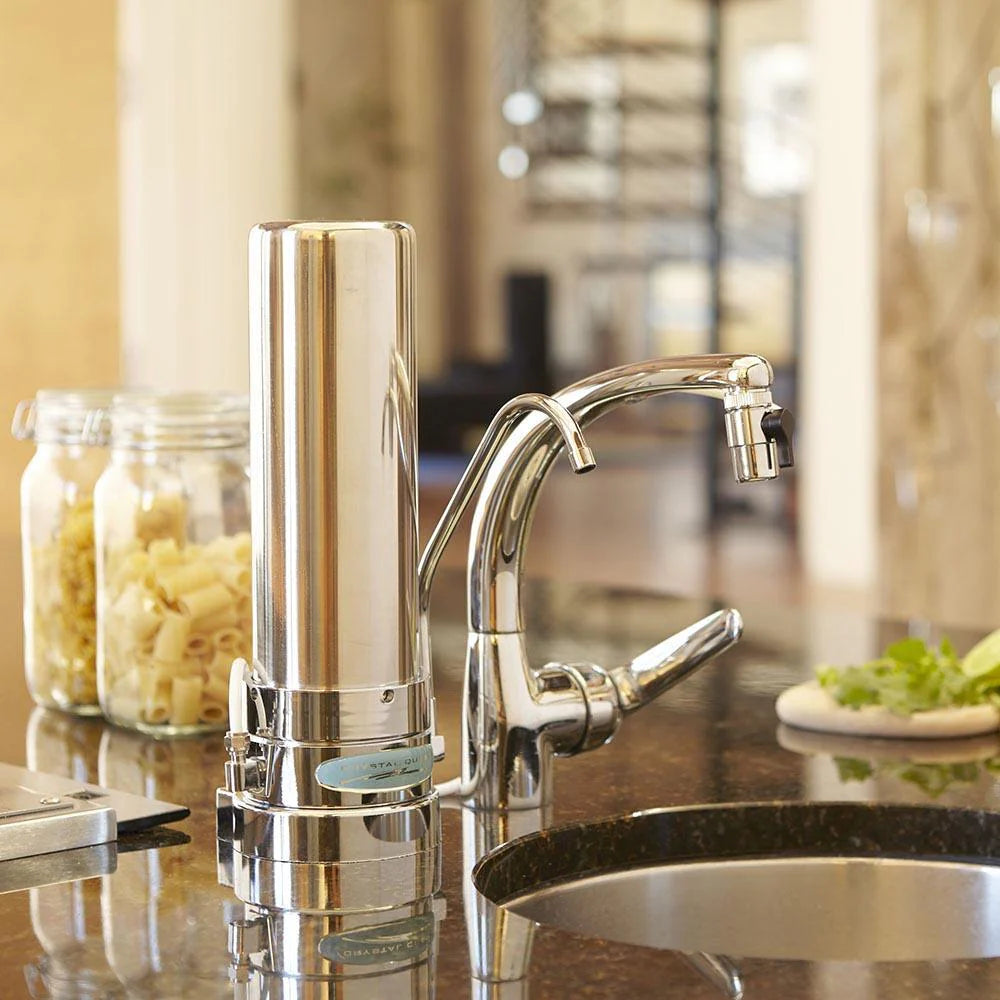
- Introduction: Choosing Your Ideal Water Filtration System
- Crystal Quest vs. Berkey: Quick Comparison Table (TL;DR)
- Understanding the Brands: A Closer Look
- Head-to-Head Comparison: Crystal Quest vs. Berkey
- Pros and Cons Summary
- Which Filter is Right for You? Crystal Quest or Berkey?
- Spotlight: Exploring Crystal Quest’s Filtration Solutions
- Conclusion: Making Your Final Decision
- Frequently Asked Questions (FAQ)
Introduction: Choosing Your Ideal Water Filtration System
Welcome! If you’re reading this, you’re likely comparing Crystal Quest vs. Berkey, trying to determine the best water filter for your specific needs. Both brands are significant players in the water filtration market, but they cater to different requirements and philosophies. Navigating their offerings can be confusing, but that’s where we at BestReVu come in. We provide Best Reviews based on thorough analysis to guide your decisions.
Crystal Quest is recognized for its exceptionally broad range of filtration technologies. They offer solutions spanning countertop units, under-sink systems, whole house filters, and even commercial-grade equipment, often employing multi-stage filtration processes. They also emphasize their claim of manufacturing in the USA.
Berkey, on the other hand, is renowned for its iconic stainless steel, gravity-fed countertop systems. Powered by their Black Berkey purification elements, these filters are popular for everyday use and hold a strong reputation in emergency preparedness circles.
This article aims to provide a detailed, unbiased comparison. We’ll delve into the technology, performance, product variety, cost, maintenance, and certifications for both Crystal Quest and Berkey. Our goal, reflecting the E-E-A-T principles (Experience, Expertise, Authoritativeness, Trustworthiness) crucial for this Your Money or Your Life (YMYL) topic, is to equip you with the information needed for an informed choice, drawing on manufacturer data, certification details, and user feedback analysis.
Crystal Quest vs. Berkey: Quick Comparison Table (TL;DR)
For a rapid overview, here’s a side-by-side look at the key differences between Crystal Quest and Berkey water filters.
| Feature | Crystal Quest | Berkey |
|---|---|---|
| Primary Filter Types Offered | Countertop, Under-Sink, Whole House, Shower, Commercial, Specialty (RO, UF, UV, Multi-stage) | Gravity-fed Countertop/Portable, Shower Filters, Bottles |
| Core Filtration Technology | Wide range: Activated Carbon, KDF, SMART Media, RO, UF, UV, Ion Exchange, Specialized Media | Proprietary Black Berkey purification elements (Micro-pores, Adsorption, Ion Exchange) |
| Typical Contaminant Focus | Broad spectrum, including targeted removal of specific chemicals (Chlorine, VOCs, Fluoride, Arsenic), Heavy Metals, Sediment | Broad purification including pathogenic bacteria, viruses (based on their tests), Chlorine, VOCs, Heavy Metals |
| NSF/ANSI Certifications Status (General) | Often meets standards for components/media; full system certification varies by model (check specifics) | Relies primarily on independent lab testing; not typically NSF certified as complete systems |
| Product Range Breadth | Extremely wide, covers nearly all residential and commercial applications | Narrow focus, primarily gravity-fed countertop systems |
| Typical Price Range (Initial) | Wide ($100 – $2500+ depending on system type) | Moderate ($300 – $600+ for standard countertop systems) |
| Average Filter Replacement Cost/Frequency | Highly variable; cartridges range from ~$30-$150+, replacement every 6-12 months or based on gallons (RO/Whole House longer) | Elements ~$160-$180 per pair, last ~6,000 gallons (requires periodic cleaning) |
| Primary Power Requirement | Varies (None for basic countertop/gravity; Required for RO pumps, UV) | None for gravity systems |
| Ideal Use Cases | Targeting specific contaminants, needing under-sink/whole house solutions, commercial applications, desire for diverse tech options | Countertop use, portability, emergency preparedness, off-grid living, prioritizing microbiological purification |

Understanding the Brands: A Closer Look
Before diving into the direct comparison, let’s understand the core philosophy and strengths of each brand.
Crystal Quest: The Comprehensive Filtration Specialist
Crystal Quest operates on the philosophy of providing diverse and targeted water filtration solutions. They aim to address a wide spectrum of water quality issues with an extensive product catalog. Their approach often involves multi-stage filtration, combining different media like their proprietary SMART media, various forms of activated carbon, KDF, and advanced technologies like Reverse Osmosis (RO), Ultrafiltration (UF), and UV sterilization.
Their key strengths lie in this versatility. Whether you need a simple countertop filter, a complex under-sink RO system, a robust whole house filter, or even large-scale commercial equipment, Crystal Quest likely has an option. They also offer specialized filters designed to tackle difficult contaminants such as Fluoride, Arsenic, Nitrates, and Lead. Their target audience includes homeowners, renters, and businesses facing diverse or specific water challenges.
Berkey: The Gravity-Fed Purification Icon
Berkey’s philosophy centers on powerful, simple, gravity-fed water purification. Their fame rests largely on the Black Berkey purification elements, which are designed to reduce a vast array of contaminants, including pathogenic bacteria and viruses (based on their independent testing claims). This makes them stand out as “purifiers” rather than just “filters” in their marketing.
Their main strengths are the effectiveness of these elements, the systems’ portability (no electricity needed), the durable stainless steel construction common to their popular models, and simple operation. This focus has earned Berkey a loyal following, particularly among those interested in emergency preparedness, off-grid living, and seeking a reliable countertop solution without complex installation.
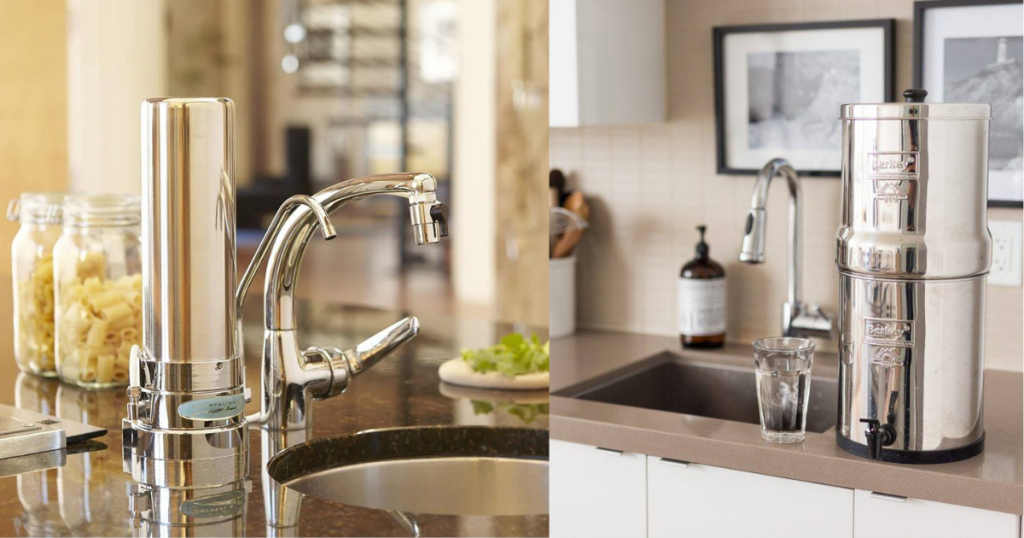
Head-to-Head Comparison: Crystal Quest vs. Berkey
Now, let’s pit Crystal Quest vs. Berkey directly against each other across the most critical factors.
Filtration Technology and Performance
Crystal Quest employs a wide arsenal of technologies. Common methods include Activated Carbon (GAC and block) for chlorine and chemicals, KDF media for heavy metals and bacteria control, Ultrafiltration (UF) membranes for larger particles and some microbes, Reverse Osmosis (RO) for the most comprehensive dissolved solids removal, and UV light for sterilization. Their multi-stage concept layers these technologies to target a broader range of contaminants effectively. They also offer filters specifically designed for high reduction of Fluoride, Arsenic, etc. *Crucially, performance varies significantly by model; always check the specific product’s specification sheet.*
Berkey primarily relies on its proprietary Black Berkey purification elements. These elements utilize micro-pores to filter particulates, adsorption to capture chemicals, and ion exchange to reduce heavy metals. Gravity is the driving force, meaning flow rate is naturally slower than pressurized systems. Berkey classifies its systems as purifiers due to their demonstrated ability (in independent tests they commission) to remove pathogenic bacteria and viruses to high levels. Their effectiveness on dissolved solids like fluoride is limited unless paired with separate PF-2 fluoride/arsenic reduction elements.
Direct Comparison: The fundamental difference lies in Crystal Quest’s technological breadth versus Berkey’s specialized gravity elements. For common contaminants like chlorine and VOCs, both can be effective. However, for *specific* issues like high fluoride levels, Crystal Quest offers dedicated filter models, whereas Berkey requires add-on elements. For microbiological threats, Berkey’s purification claims (based on their testing) are a core selling point. *It’s vital to base decisions on specific contaminant concerns and review performance data carefully, noting the source (manufacturer claim vs. independent certification).*
Independent Certifications: NSF/ANSI Standards
Third-party certifications, particularly from NSF International to ANSI standards (like 42 for aesthetic effects, 53 for health effects, 58 for RO, 401 for emerging contaminants, and P473 for PFOA/PFOS), provide independent verification of a filter’s contaminant reduction claims. This is a critical factor for trust, especially for health-related products.
Crystal Quest often states that their filter *components* or *media* meet NSF standards. However, achieving full *system* certification for every model configuration can be complex and costly. As a result, prominent display of NSF system certifications across their entire product range may seem less consistent compared to some competitors. We advise potential buyers to inquire directly or meticulously check the documentation for the specific model they are considering.
Berkey takes a different approach. They primarily rely on independent third-party lab testing to validate the performance of their Black Berkey elements, rather than seeking full NSF system certification. Berkey has stated reasons for this, sometimes citing the cost or limitations of NSF standards for their specific gravity-fed technology. This lack of NSF system certification remains a point of discussion and concern for some consumers who prioritize this specific validation. Issues like PFAS Removal are increasingly important, and independent testing data or certifications are key for verifying claims.
Comparison: The brands have distinct approaches to validation. Crystal Quest points to component standards but system certification varies. Berkey emphasizes its independent lab results. For consumers, NSF certification offers a standardized level of assurance, while Berkey’s independent tests provide performance data that buyers must evaluate for trustworthiness. There isn’t a universally “better” approach, but the *implications* for consumer confidence differ.
Product Range and Versatility
Crystal Quest shines brightly here. Their product range is exceptionally broad: various countertop models (direct connect, multi-stage), numerous under-sink options (single/multi-cartridge, RO, UF), a comprehensive line of whole house filters (different sizes, media types, flow rates), shower filters, water softeners, and even extensive commercial/industrial systems. This breadth is arguably their most significant strength.
Berkey focuses primarily on its core competency: gravity-fed countertop systems available in various sizes (Travel, Big, Royal, Imperial, Crown). While they offer a few supplementary products like shower filters and sport bottles, their flagship products and brand identity are firmly rooted in the portable, stainless steel gravity filters.
Comparison: This is a clear differentiator. If you need anything beyond a countertop gravity filter – like an under-sink RO system, a whole house solution, or commercial equipment – Crystal Quest is the clear choice between these two brands. Berkey dominates the specific niche of high-performance gravity-fed countertop/portable purifiers.
Ease of Use and Maintenance
Setup: Crystal Quest countertop filters are generally simple to set up, often connecting directly to the faucet. Under-sink and whole house systems are inherently more complex, potentially requiring plumbing modifications and professional installation. Berkey gravity systems are straightforward to assemble (stacking chambers, inserting elements) but require an initial priming process for the Black Berkey elements.
Filter Replacement: Crystal Quest cartridge replacement frequency and cost vary widely. Simple carbon filters might need changing every 6 months, while RO membranes can last 2-5 years. The process is typically unscrewing housings and swapping cartridges. Berkey Black elements boast a long lifespan (~6,000 gallons per pair) but require periodic cleaning (scrubbing the outer layer) to maintain flow rate, and re-priming after cleaning or long storage.
Cleaning: Both systems require periodic cleaning of the housings or chambers to prevent buildup. Berkey’s stainless steel chambers are generally easy to wipe down.
Build Quality and Materials
Crystal Quest utilizes various materials depending on the product line. Many systems employ BPA-free plastics for housings and components, which is standard. Some higher-end models or specific components may feature stainless steel. General build quality appears robust, catering to both residential and demanding commercial environments.
Berkey is strongly associated with high-quality, polished 304 stainless steel for the chambers of its main gravity filter line. This contributes significantly to their durability, aesthetic appeal, and reputation, particularly in the preparedness community where longevity is valued.
Comparison: Berkey has built a strong brand identity around its durable stainless steel gravity systems. Crystal Quest offers a wider variety of materials across its extensive range, including reliable plastic and metal options suitable for different applications and price points.
Cost and Long-Term Value
Initial Purchase Price: Comparing apples-to-apples is tricky given the differing ranges. A basic Crystal Quest countertop filter might be less expensive than a standard Big Berkey system. However, Crystal Quest’s under-sink RO or whole house systems represent a significantly higher upfront investment. The keyword search `Crystal Quest water filter vs Berkey price` highlights this user interest. Berkey systems generally fall within a mid-to-high range for countertop units.
Replacement Filter Costs: This is crucial for long-term value. Crystal Quest cartridge costs vary greatly ($30-$150+ each), and multi-stage systems require replacing multiple cartridges, potentially leading to higher annual costs for some configurations. Berkey Black elements have a high initial cost per pair (~$160-$180) but their long lifespan (~6,000 gallons) can translate to a low cost per gallon, *if* they are maintained properly and reach their full potential lifespan.
Value Proposition: Crystal Quest offers value through its versatility, targeted filtration capabilities, and availability of comprehensive solutions like whole house systems. Berkey offers value through its purification claims (especially microbiological), portability, long element lifespan (potentially lowering long-term cost per gallon), and durable construction. The “better” value depends entirely on matching the system’s strengths to your specific needs and budget priorities.
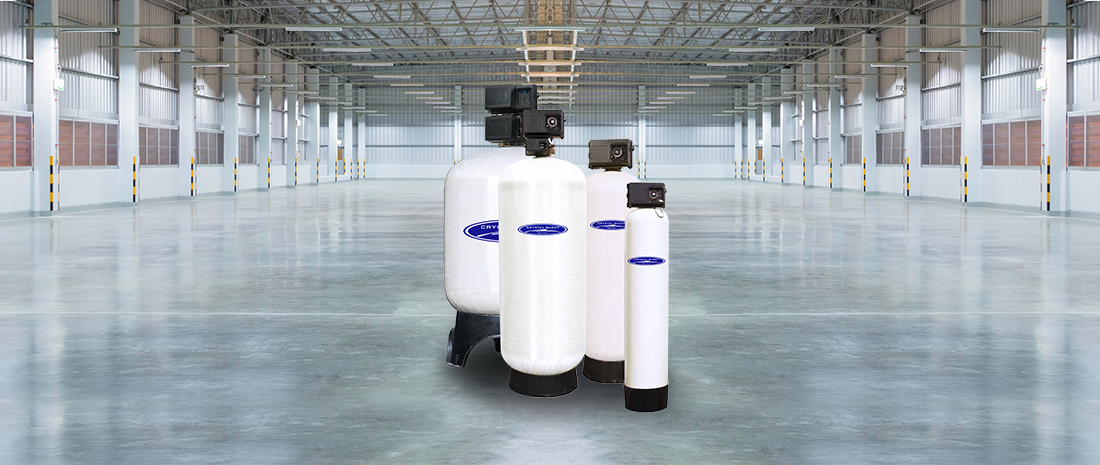
Pros and Cons Summary
Let’s consolidate the strengths and weaknesses identified in our comparison.
Crystal Quest: Strengths and Weaknesses
Pros:
- Extremely wide product range covering virtually all filtration needs.
- Specialized filters available for difficult contaminants (Fluoride, Arsenic, Nitrates, etc.).
- Diverse technology options (RO, UF, UV, Multi-stage Carbon/KDF).
- Offers robust whole house and commercial/industrial solutions.
- USA manufacturing claimed for many products.
- “One-stop-shop” potential for various filtration requirements.
Cons:
- Under-sink and whole house systems can require complex installation.
- Long-term filter costs can be high for some multi-cartridge systems.
- Clarity and prominence of full system NSF certifications can vary by model.
- Brand recognition might be lower than Berkey in the gravity filter niche.
Berkey: Strengths and Weaknesses
Pros:
- Excellent portability and off-grid capability (gravity models).
- No electricity required for main systems.
- Very long lifespan for Black Berkey purification elements.
- Effective purification, especially against bacteria/viruses (based on their tests).
- Simple operation and setup (after initial priming).
- Durable and aesthetically pleasing stainless steel construction.
- Strong reputation in preparedness and specific health communities.
Cons:
- Limited product range, primarily focused on gravity countertop filters.
- Slower flow rate compared to pressurized systems.
- Requires regular element cleaning/priming for optimal performance.
- Relies on independent lab testing vs. full NSF system certification, which is a concern for some buyers.
- Effectiveness for certain dissolved contaminants (like fluoride) requires separate, add-on filters (PF-2).
- Does not offer under-sink RO or traditional whole house systems.

Which Filter is Right for You? Crystal Quest or Berkey?
The “best” choice in the Crystal Quest vs. Berkey debate truly depends on your individual circumstances. Here’s a guide to help you decide, directly addressing the common question: `which is better Berkey or Crystal Quest`?
Choose Crystal Quest If:
- You need a specific type of filter that Berkey doesn’t offer (e.g., Under-Sink RO, Whole House System, Water Softener, UV Sterilizer).
- You have specific, challenging contaminants in your water (like high levels of Fluoride, Arsenic, Nitrates, Lead, Iron) and need a filter *specifically designed* to target them (always verify the model’s specs).
- You desire advanced filtration technologies like Reverse Osmosis or Ultrafiltration for maximum dissolved solids removal.
- You require a high flow rate for convenience or need to treat water for your entire home (Point-of-Entry).
- You are looking for commercial-grade filtration solutions for a business.
- You prefer having a wide array of options and configurations available from a single brand.
BestReVu Assessment: Crystal Quest stands out for its sheer adaptability. If your water problems go beyond what a simple countertop filter can handle, or if you need specialized treatment, their extensive catalog provides solutions where Berkey simply doesn’t compete.
Choose Berkey If:
- Your primary need is a high-performance countertop gravity-fed system.
- Portability, emergency preparedness, or use without electricity are top priorities (camping, off-grid homes, power outages).
- You value an extremely long filter element lifespan and are willing to perform periodic cleaning/priming.
- Your main water quality concern involves microbiological contaminants (bacteria, viruses), and you trust their independent test results for purification.
- You appreciate the durable, classic stainless steel design for a countertop unit.
- You are specifically looking for gravity filter options and comparing them (implicitly addressing `Berkey alternatives` by choosing Berkey).
Considering Alternatives?
While this article focuses intensely on the Crystal Quest vs. Berkey comparison, it’s worth remembering other reputable brands exist in the `water filter brands comparison` landscape (like Aquasana, APEC, iSpring, Propur, Pentair). However, if Berkey’s limitations (like lack of under-sink RO or whole house options) don’t meet your needs, Crystal Quest emerges as a very strong contender due to its vast product diversity, often serving as an excellent alternative, particularly for more complex filtration requirements.
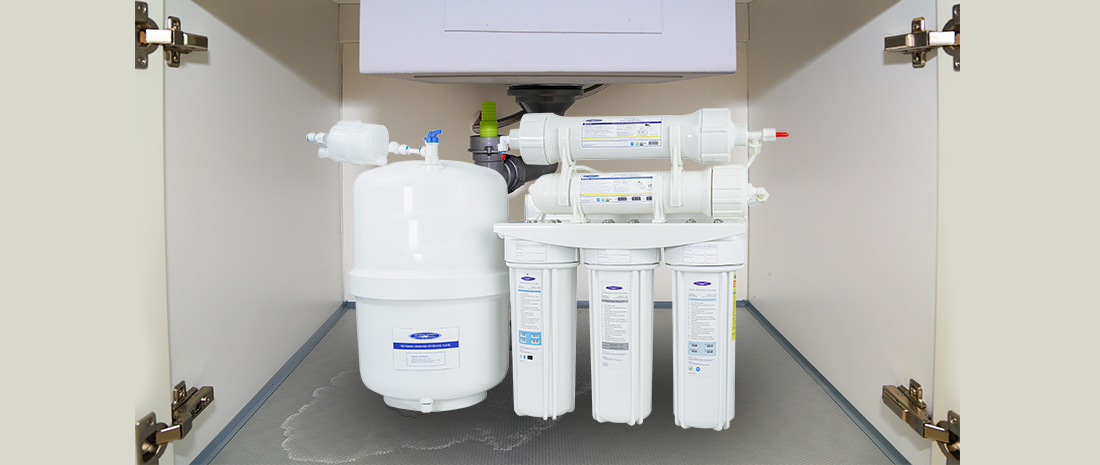
Spotlight: Exploring Crystal Quest’s Filtration Solutions
Given Crystal Quest’s strength in variety, let’s briefly highlight some of their key solution categories. This range is where they truly differentiate themselves from Berkey’s focused lineup. As reviewers at BestReVu, we appreciate when a brand offers tailored solutions for diverse problems.
Countertop Filters
Beyond simple faucet filters, Crystal Quest offers multi-stage countertop units that connect directly to your plumbing. These provide more advanced filtration than basic pitchers but without requiring under-sink installation. They represent a step up in performance for countertop convenience.
Attention: Better water is just a click away. Interest: Explore Crystal Quest’s easy-to-install countertop filters for immediate improvement in taste and quality. Desire: Imagine having clean, filtered water right from a dedicated tap on your counter.
Action: Find the perfect Crystal Quest Countertop Filter Now!
Under-Sink Systems (RO & Multi-Stage)
For those seeking high-level purification hidden away, Crystal Quest’s under-sink systems are compelling. Options include multi-stage filters targeting specific contaminants and Reverse Osmosis (RO) systems for removing the widest range of dissolved solids, providing water often superior to bottled quality.
Attention: Tired of countertop clutter? Interest: Crystal Quest’s under-sink systems deliver powerful filtration discreetly. Choose multi-stage or premium RO for ultimate purity. Desire: Enjoy pristine water from your main kitchen faucet.
Action: Upgrade Your Kitchen with Crystal Quest Under-Sink Filters!
Whole House Filters
Treating water at the point it enters your home offers comprehensive protection. Crystal Quest’s whole house systems reduce contaminants like chlorine, sediment, and heavy metals throughout your entire home. This improves water for drinking, cooking, bathing, and protects plumbing and appliances from scale and corrosion.
Attention: Want clean water from every tap? Interest: Crystal Quest Whole House Systems protect your entire home’s plumbing and provide filtered water everywhere. Reduce chlorine, sediment, and more. Desire: Experience softer skin, cleaner laundry, and protected appliances.
Action: Secure Clean Water Throughout Your Home – Explore Whole House Systems!
Commercial Solutions
Crystal Quest also caters to businesses with demanding water quality needs. From restaurants and breweries needing high-purity water to industrial applications requiring specific water treatment protocols, their commercial division offers customized, scalable solutions including large RO systems, conditioners, and specialized filtration.
Attention: Business relying on water quality? Interest: Crystal Quest provides tailored commercial filtration solutions for industries needing reliable, purified water. Desire: Ensure consistent product quality, protect equipment, and meet industry standards.
Action: Businesses: Explore Crystal Quest Commercial Solutions Today!
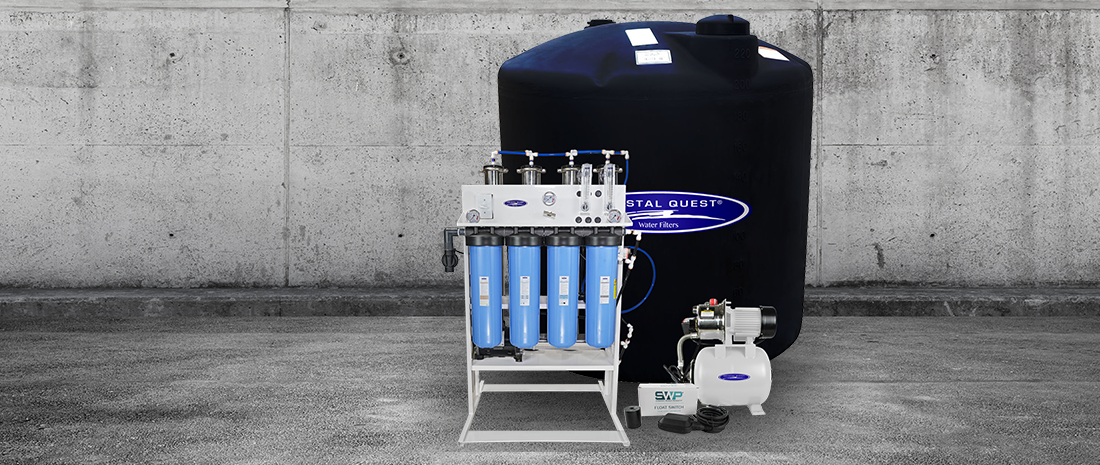
Conclusion: Making Your Final Decision
Choosing between Crystal Quest and Berkey boils down to aligning their core strengths with your specific needs. We’ve seen that Crystal Quest offers unparalleled range and technological diversity, excelling in specialized contaminant removal and providing solutions from simple countertop units to complex under-sink, whole house, and commercial systems. Berkey, conversely, is the specialist in high-performance, portable, gravity-fed countertop purification, renowned for its long-lasting elements, effectiveness against microbiological threats (per their testing), and off-grid capability.
There is no single “winner” in the Crystal Quest vs. Berkey matchup. The “better” filter is the one that best solves *your* water quality problems, fits *your* installation preferences (countertop, under-sink, whole house), aligns with *your* budget (both initial and long-term), and meets *your* requirements for performance validation (NSF certification vs. independent testing). As we emphasize in our Best Reviews, understanding your own priorities is paramount.
We hope this detailed comparison has illuminated the key differences and helped you weigh the pros and cons effectively. Consider your water source, the contaminants you need to address, where you want filtered water, and your budget.
Final Thought from BestReVu: If your needs extend beyond basic countertop gravity filtration, or if you’re tackling specific challenging contaminants, Crystal Quest’s extensive and specialized offerings present a compelling advantage. Don’t settle for less than the right solution for *your* water.
Frequently Asked Questions (FAQ)
Is Berkey better than Crystal Quest for fluoride removal?
Standard Black Berkey elements offer limited fluoride reduction. Effective fluoride removal with Berkey requires adding separate PF-2 filters, which adds cost and complexity, and these PF-2 elements have a much shorter lifespan. Crystal Quest offers several filter systems *specifically designed* for high fluoride reduction using specialized media, often integrated into multi-stage countertop or under-sink systems. For dedicated fluoride removal, Crystal Quest generally provides more integrated and targeted options; check specific model performance data.
Which filter lasts longer, Crystal Quest or Berkey?
Berkey Black Berkey elements have a very long rated lifespan (~6,000 gallons per pair), potentially lasting years depending on usage and water quality, but require periodic cleaning. Crystal Quest filter cartridge lifespan varies *dramatically* by type and system. Basic sediment or carbon filters might last 6-12 months, while RO membranes can last 2-5 years, and whole house media might last 3-10+ years. It’s essential to compare the specific systems and consider cost-per-gallon over the filter’s lifetime.
Are Crystal Quest filters NSF certified?
Crystal Quest often states that filter components or media meet NSF/ANSI standards (e.g., NSF 42 for chlorine, NSF 53 for health contaminants). However, full *system* certification for specific contaminant reduction claims across all their diverse models is less consistently advertised than some competitors. It’s best practice to verify the certification status for the specific Crystal Quest model you are interested in by checking product documentation or contacting the company directly. This contrasts with Berkey’s reliance on independent lab testing.
What are the main differences between Crystal Quest and Berkey technology?
The core difference is breadth vs. focus. Crystal Quest utilizes a wide array of technologies including Activated Carbon, KDF, SMART Multimedia, Reverse Osmosis (RO), Ultrafiltration (UF), UV Sterilization, and specialized media, configurable into many system types (countertop, under-sink, whole house). Berkey primarily uses its proprietary Black Berkey purification elements in gravity-fed systems, focusing on micro-filtration, adsorption, and ion exchange within those specific elements.
Can I get a whole house filter from Berkey?
No, Berkey does not typically offer traditional whole house (point-of-entry) filtration systems. Their expertise and product line are focused on countertop and portable gravity-fed water purification systems. If you need a whole house water filter, Crystal Quest is the appropriate choice between these two brands, offering numerous whole house options.

1 thought on “Crystal Quest vs. Berkey (2025): An In-Depth Comparative Analysis”